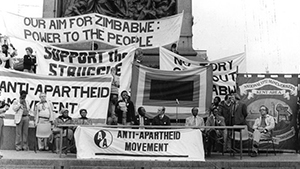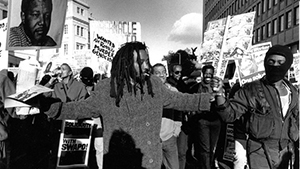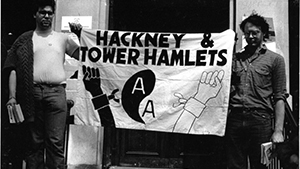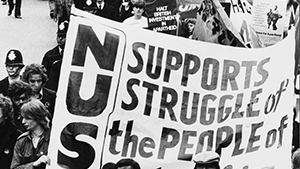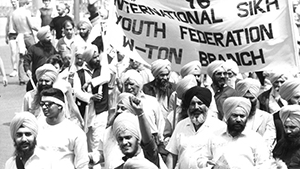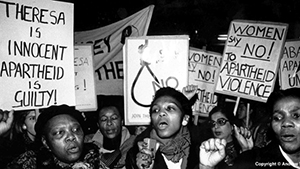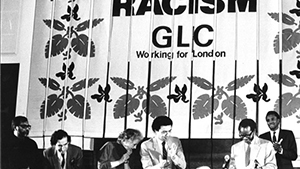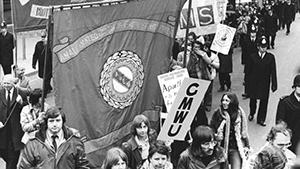Who was involved with the Anti Apartheid Movement
Musicians, writers and performers were hugely important in publicising anti-apartheid campaigns and winning mass support for the Anti-Apartheid Movement. From the AAM’s earliest years stars of stage and screen campaigned for a boycott of South Africa and took part in events that dramatised life under apartheid. In the 1980s rock musicians spearheaded the campaign to free Nelson Mandela and bands put on fund-raising gigs all over Britain.
THEATRE
In 1963, leading playwrights, including Samuel Beckett, refused permission for their plays to be shown before segregated audiences. The actors union Equity followed suit. Marlon Brando and British actors like Warren Mitchell, Una Stubbs and Ian McKellen took part in fundraising shows in the Royal Festival Hall and Central Hall Westminster. Kenneth Williams, Albert Finney and Sheila Hancock demonstrated outside South Africa House calling for the release from detention of South African actors Winston Ntshona and John Kani.
FUNDRAISING
From the 1960s, artists like Ewan MacColl, Peggy Seeger and Cleo Laine took part in gigs to raise funds for the AAM. South African jazz musicians Dudu Pukwana and the Blue Notes played at ANC fundraising dances and demonstrated to the wider world the vibrancy of music from Southern Africa. Later the Bhundu Boys from Zimbabwe played at the The Brixton Academy and other venues.
ARTISTS AGAINST APARTHEID
Artists Against Apartheid was set up in 1986 and supported concerts featuring hundreds of artists including Billy Bragg, The Smiths, The Pogues and Elvis Costello. Its biggest concert was the Festival for Freedom at London’s Clapham Common on 28 June 1986. A quarter of a million people heard an all-star line-up led by Gil Scott-Heron, Boy George, Elvis Costello and Peter Gabriel.
FREE MANDELA CAMPAIGN
The Festival of African Sounds at Alexandra Palace in 1983, with Hugh Masekela, Julian Bahula and Osibisa, sparked an explosion of songs celebrating the South African liberation struggle. Jerry Dammers ‘Free Nelson Mandela’ went to the top of the charts. In June 1988 the AAM launched its ‘Free Nelson Mandela at 70’ campaign at a concert at Wembley stadium attended by a capacity audience of 92,000 and broadcast by the BBC to 63 countries. International artists included Stevie Wonder, Whoopi Goldberg, Hugh Masekela and George Michael.
LOCAL GIGS
Concerts and festivals were part of the repertoire of local anti-apartheid groups, often with support from local councils. They spread the anti-apartheid message and raised much-needed funds for anti-apartheid campaigns.
CLICK HERE FOR ARTISTS AGAINST APARTHEID DOCUMENTS AND PICTURES
RAISING AWARENESS OF APARTHEID
Healthworkers, architects and lawyers all set up groups to raise awareness of the impact of apartheid in their own professional areas. They campaigned to end the links between British and international organisations and whites only bodies in South Africa. As resistance to apartheid grew, they supported their South African colleagues in their fight against racial segregation.
A SPECIAL RESPONSIBILITY
From the early 1950s Britain’s growing black community felt a special responsibility to help their brothers and sisters living under apartheid in South Africa. Black groups in Britain supported the peoples of Zimbabwe, Namibia, Angola and Mozambique fighting guerrilla wars against white minority regimes.
BOYCOTTING APARTHEID
The Anti-Apartheid Movement’s local groups gave it a presence all over Britain. Some groups had hundreds of members and links to trade unions, churches and community organisations. Others were kept going by a few dedicated activists.
DISINVESTMENT CAMPAIGNS
Students were at the forefront of Anti-Apartheid Movement campaigns. They collected funds for the Southern African liberation movements, campaigned against investment in apartheid and took action in solidarity with students in South Africa. In 1969/70 students took the lead in direct action and mass demonstrations against the rugby and cricket Springbok tours.
MULTI-FAITH INITIATIVES
The Anti-Apartheid Movement reached out to involve people of all faiths in campaigning against apartheid. Its Multi-Faith Committee was set up at an Inter-Faith Colloquium on Apartheid organised by AAM President Trevor Huddleston in 1984. The Colloquium was attended by Buddhists, Christians, Hindus, Jews, Muslims and Sikhs. The group worked to increase awareness of the evils of apartheid among people of faith.
Women played a special part in the Anti-Apartheid Movement. They highlighted the ways in which black women in Southern Africa were doubly oppressed – as black people and as women. They campaigned for women throughout the Southern African region, in Zimbabwe, Namibia and the front-line states, as well as in South Africa.
COUNCIL BOYCOTTS
Many local councils boycotted South African products in the Boycott Movement’s March Month of Action in 1960, the first British boycott campaign. By the mid-1960s, 54 councils were banning goods from South Africa from their offices and schools, many of them in Wales. In Scotland, the huge Strathclyde Regional Council imposed a ban in 1975.
British trade union support underpinned the Anti-Apartheid Movement in the 1980s. By 1990, 43 national trade unions, including every major union, were affiliated to the AAM. The AAM worked at every level of the movement. It lobbied union leaders and held conferences and workshops for rank and file trade unionists.

